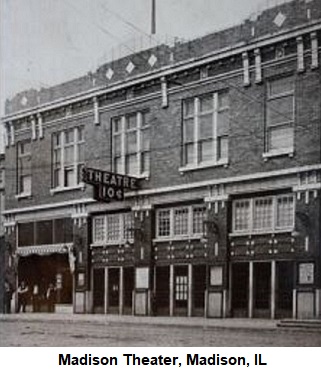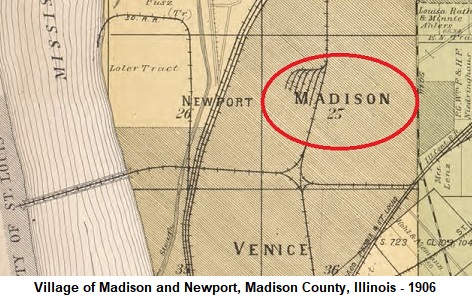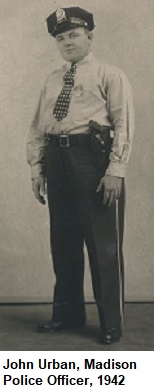Early History of Madison and Newport
The village of Madison, lying mainly in Venice Township, but
partly in Nameoki Township, was incorporated November 02, 1891, with
a population of 1,979. It is the third village of that name located
in Madison County. The first Madison was laid out in 1820 in Marine
Settlement by Curtis Blakeman, R. P, Allen, George C. Allen, and
others. A sale of 100 lots was to take place there on November 20,
1820, but the new town either died off or was absorbed by the
village of Marine. The second village of Madison was located along
the Mississippi River in Chouteau Township. For a time, it was a
flourishing village. Steamboats landed there to receive and unload
freight. Hon. Zephaniah B. Job once conducted a store there, and
carried a thirty-thousand-dollar stock of goods. The encroachment of
the river long since swept it away.
The third village of Madison was the result of a meeting of St.
Louis merchants who desired to find a location for manufacturing
plants on the east side of the Mississippi River. The industrialists
formed a syndicate in 1887 known as the Madison Land Syndicate, and
promoted the construction of a new railroad bridge, which they named
“Merchants Bridge.” The group was looking to avoid paying the high
cost of transporting coal over the Eads Bridge into Missouri.
The Missouri Car and Foundry Company
The Missouri Car and Foundry Company, which was founded in St. Louis
in 1890, began construction of their large plant in Illinois. About
the same time, Standard Oil Company started a large barrel works.
This was followed by the Merchants Bridge roundhouse and a large
grain elevator. These first industries employed approximately 2,500
people, who were taken back and forth every day over Merchants
Bridge on a work train. Many of the employees didn’t like the daily
train ride, and encouraged the Missouri Car and Foundry to erect two
long rows of houses to be used as residences for their families. The
Madison Land Syndicate stepped in and laid out the present site of
the city on land purchased from William and Nancy Sippy for the sum
of $117.800.
The Founding of Madison
A group of boosters for the locality, headed by Patrick McCambridge,
a Deputy Sheriff who later became Chief of Police of Madison, made
preparations for a town site. On November 02, 1891, the village of
Madison was incorporated, with Charles C. Skeen elected as first
president. Electric street lights were installed the same year. The
population was growing steadily. By 1891, the village had a
three-story hotel and a Presbyterian Church.
The first big fire in Madison occurred in 1907, when Waschaeur’s
Department Store burned. In 1910 a fire wagon and two horses
replaced the old hand truck, and three years later a volunteer fire
department was organized under Chief Pearl Smith.
Progress

Early Banks
Madison had two reliable financial institutions – the First National
Bank, with Fred Troecklen as president, and L. A. Cook as cashier;
and The Tri-City Bank, with Charles R. Kiser as president and R. B.
Studebaker as cashier.
Early Churches
A Baptist Church was constructed in 1908, and in 1914 a Methodist
Church was dedicated in a building that previously was occupied by a
long-distance telephone exchange. During the 1920s, a new
Presbyterian Church was built, and St. Mary’s Catholic School opened
with 230 pupils.
The Madison Public Library
Madison Public Library was erected in 1947. In October 1948, the
Memorial Center Recreational Hall was opened and dedicated. In 1948,
plans were made for additions to the Louis Baer and Dunbar Schools,
and for a new high school. The old Madison High had been built in
1914.
The Helmbacher Forge and Rolling Mill
Company
This company was founded in St. Louis, and by 1907 was located in
Madison, Illinois. The company was destroyed by fire in December
1920. Firefighters from Madison, Granite City, and Venice battled
the blaze, assisted by several fire companies from St. Louis.
NEWPORT
The town of Newport was laid out in 1858 by I. W. Blackman of St.
Louis, Missouri, and joins the village of Madison on the east. The
plat was recorded April 27, 1858. On Section 24 was the railroad
station of Kinder. The town consisted mostly of a few dwelling
houses. Near the station was a two-story brick schoolhouse, built by
special legislation obtained through the efforts of Calvin Kinder
and others. It was later used by the German Lutherans as their
church.

